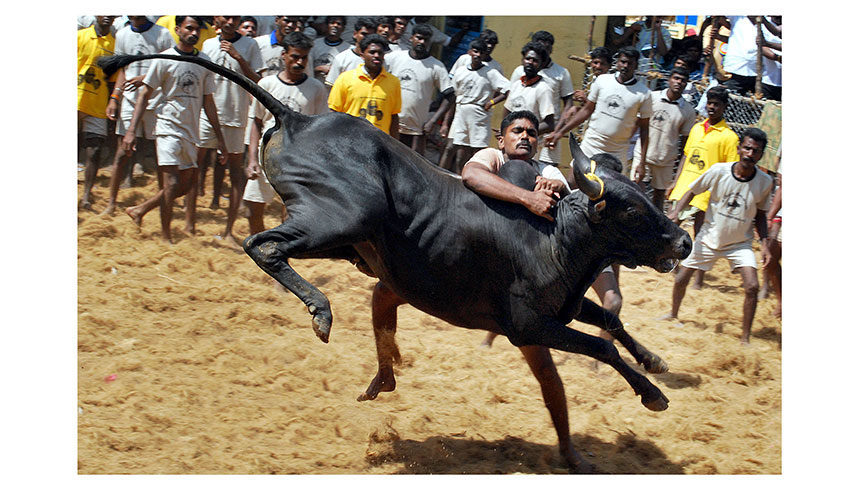What is Jallikattu?
This post has been written by Saumya Bhardwaj of Amity Law Achool, Delhi
Jallikattu is a traditional bull-taming sport organized in the state of Tamil Nadu during Pongal. This sport is being practiced since 2000 years. This event was actively conducted in many districts of Tamil Nadu like Madurai, Theni, Dindigul and Tiruchirappalli until its ban in 2011. Jallikattu is also known as Manju Virattu or Eruthazhuvuthal.
How is it played?
Jallikatu is a bull-taming sport which is played by setting free a bull in an arena with willing participants. The challenge is to tame the bull with bare hands. The participants wrestle with the bull and often try to grab the bull by its horns or tails. Participants try to hold the hump of the bull for as long as possible and try to bring the bull to a stop. In some events of Jallikattu, participants need to ride on the bull long enough to remove the flags on the bull’s horns.
The controversy over Jallikattu
The Animal Rights Organizations in India have protested against Jallikattu. Since 2004, the organizations like People for the Ethical Treatment of Animals (PETA) and Federation of India Animal Protection Agencies (FIAPA) have been opposing Jallikattu.
Due to the cruelty faced by animals and the threat to public safety in the event of Jallikattu, the Animal Welfare Board of India (AWBI) has approached the Supreme Court for an outright ban on this event. On 27 November, 2010, the Supreme Court permitted the government of Tamil Nadu to hold the event for five months in a year and the District Collectors were asked to make sure that the animals participating in Jallikattu are duly registered with the Animal Welfare Board. An AWBI representative was also asked to be present at the Jallikattu events.
In 2011, the Ministry of Environment and Forests banned the use of bulls in sports and fun activities, thereby banning the festival. However, the Tamil Nadu Regulation of Jallikattu Act 2009 legalized Jallikattu. Between the years 2010 and 2014, around 17 people were killed and around 1000 people were injured during the Jallikattu events.
At last, in May 2014, the apex court struck off the 2009 Act, and banned the abysmal practice. It further warned that any flouting of the ban would result in higher penalties under the Prevention of Cruelty to Animals Act, 1960.
However, the tug of war between the apex court and Central government continued. On January 8, 2016, the Central Government allowed the practice of Jallikattu, through a notification. The Supreme Court then re-imposed the ban on the Jallikattu event in July, 2016.
Supreme Court verdict on Jallikattu
The Supreme Court said, “bulls cannot be allowed as performing animals, either for Jallikattu events or bullock-cart races in the state of Tamil Nadu, Maharashtra or elsewhere in the country.”
The Supreme Court named and identified “the five freedoms” of animals:
- Freedom from hunger, thirst and malnutrition
- Freedom from fear and distress
- Freedom from physical and thermal discomfort
- Freedom from pain, injury and disease
- Freedom to express normal patterns of behavior.
The Animal Welfare Board of India (AWBI) had argued that the bulls used are physically and mentally tortured merely for pleasure and enjoyment of human beings by providing proof in the form of photographs and witnesses.
According to AWBI, Jallikattu have no historical, cultural or religious significance in the state of Tamil Nadu or Maharashtra, and that the Prevention of Cruelty to Animals (PCA) Act, 1960, must ban any such practice. PETA’s investigators found that the bulls were being disoriented deliberately. The bulls’ tails were badly beaten and twisted. They were stabbed, punched and harshly dragged on the ground. Hence, the Supreme Court banned this abysmal practice.
Present Outrage
On January 8, 2016, the Environment Ministry changed its earlier notification and despite the existing ban, it declared that the sport could continue. This was in direct contravention with the top court order, and was duly challenged by People for the Ethical Treatment of Animals (PETA).
The Supreme Court had restrained the Tamil Nadu government from conducting Jallikattu, questioning the “necessity of such festivals”. In January 2017, before Pongal, the protests against Jallikattu ban started. On January 12, 2017, the Supreme Court rejected a plea by lawyers seeking an urgent ruling against the ban. This rejection by the Supreme Court prevented the Jallikattu event from taking place during the time of Pongal and infuriated large sections of the Tamil Nadu population.
Not supporting the Supreme Court ban, the Jallikattu event was held in a few places in the state, especially in Madurai, the police arrested many people for it. The protest started in the rural areas, soon began to find support from the students, a few IT professionals and even some sports persons and famous actors in urban areas.
Why do Tamilians support Jallikattu?
People living in Tamil Nadu consider Jallikattu as a symbol of their excellence and pride as it a very ancient tradition carried on for years. Jallikattu involves thousands of participants, trying to tame bulls by latching upon their humps or horns. The Dravidian Literature is full of Jallikattu and its importance. The Jallikattu protest is because of the view that the ban harms the cultural identity of the Tamil population.
Due to the Supreme Court’s decision to ban the Jallikattu event, the sports bull prices have gone down. This has brought anger amongst the people in Tamil Nadu.
Apart from the cultural angle, Jallikattu is economically favorable for a few. By rearing sport bulls, small farmers and the rural poor get a chance to make a low investment in a calf and gives an opportunity to the poor to get big returns if it performs well in the Jallikattu event. Rearing a Jallikattu bull also supports a few poor people who make accessories for the bull.
Conclusion
An ordinance was passed by the Governor of Tamil Nadu for the conduct of jallikattu. The Union Government has also cleared the state’s draft Ordinance to amend the Prevention of Cruelty to Animals Act, 1960, enabling the conduct of jallikattu. As envisaged under Article 213 of the Constitution, the state government has issued an ordinance after obtaining the important prior instructions of the President. Now, the jallikattu event will be conducted all over the state with all the essential safeguards.
Karnataka follows Tamil Nadu’s footsteps
Karnataka High Court had passed an interim order banning the practice of Kambala – traditional buffalo race in November 2016 after a petition was filed by PETA (People for Ethical Treatment of Animals).
The decision led to widespread protests. The protests gained even more fervour after Tamil Nadu government’s decision to allow Jallikattu. Therefore, succumbing to pressure, the Karnataka assembly passed a Prevention of Cruelty to Animals (Karnataka Amendment) Bill, 2017.
The Bill seeks to amend Prevention of Cruelty to Animals Bill, 1960 in its application to Karnataka to the extent that activities such as Kambala and ‘related bullock cart races must be exempted provided no unnecessary pain or suffering is inflicted on the animal.
The government amends Section 22 – restriction on exhibition and training of performing animals and Section 27 – list of exemptions.
While, PETA has criticised the move of the southern states to legalise animal sports as a shame to the entire nation, leaders across parties in the state have appreciated the move to protect the traditional sport of Karnataka.
Congress leader Shakuntala Shetty said “As far as cruelty of animals in Kambala goes, the bullocks are treated by their owners as much more of a child than their own children. They are fed like kings and, barring some 26 days of the race, they are kept very comfortably,” said Congress legislator Shakuntala Shetty.
Picture Courtesy: Wikimedia







